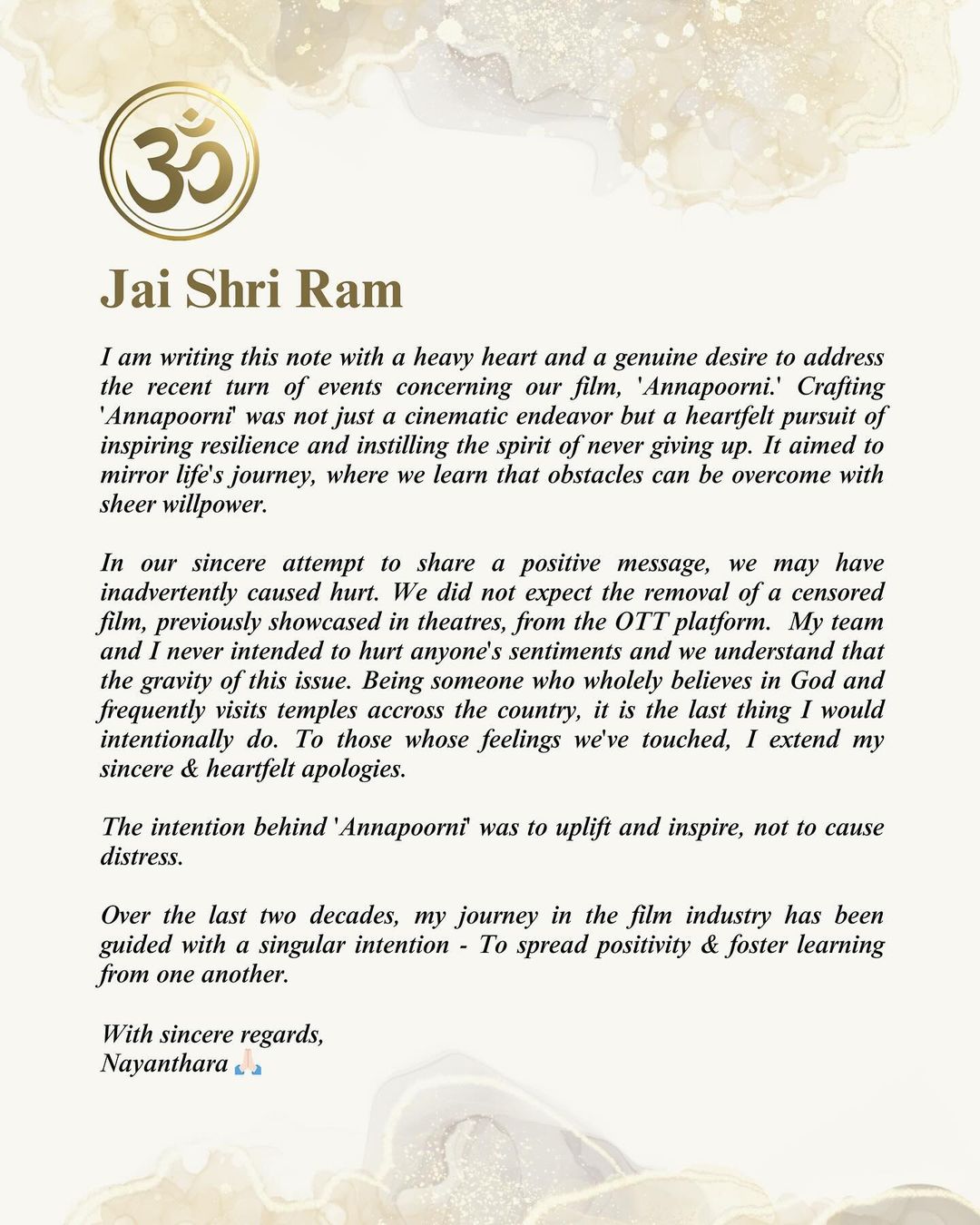
Annapoorani Controversy, Nayanthara’s Apology and Lessons for Filmmakers
Recently, acclaimed actor Nayanthara found herself at the centre of controversy surrounding her film ‘Annapoorani: The Goddess of Food.’ The Tamil film, released in theaters on December 1 and later on Netflix on December 29, faced accusations of hurting religious sentiments and disrespecting Lord Ram, leading to an FIR against the film and its subsequent removal from the OTT platform. Nayanthara, in response, issued a heartfelt apology on Instagram, expressing regret over any unintended hurt caused.
The film narrates the compelling story of a young girl from an orthodox Hindu Brahmin family with aspirations of becoming a chef. The narrative unfolds against a backdrop of trials and tribulations, showcasing the challenges faced by the protagonist in pursuing her dreams. The film’s intent was to convey a positive message and inspire audiences, but it inadvertently stirred controversy.

Taking to Instagram, Nayanthara expressed regret for any unintentional hurt caused by the film. She clarified that neither she nor her team intended to hurt anyone’s sentiments and were surprised by the removal of a film that had previously been showcased in theaters. The actor emphasized her belief in God, citing her frequent visits to temples across the country, and stated that intentionally causing distress was the last thing on her mind.
Quoting Nayanthara’s Instagram post: “In our sincere attempt to share a positive message, we may have inadvertently caused hurt…To those whose feelings we’ve touched, I extend my sincere and heartfelt apologies.”
Intent Behind ‘Annapoorani’
Nayanthara highlighted the original intent behind ‘Annapoorani: The Goddess of Food,’ emphasizing that the film aimed to uplift and inspire rather than cause distress. She reflected on her two-decade-long journey in the film industry, driven by a singular intention: to spread positivity and foster learning.
Some of the controversial scenes in the movie involve Nayanthara’s character engaging in namaz while wearing a hijab before preparing biryani. Additionally, a friend allegedly influences her to cut meat by asserting that Lord Rama and Goddess Sita consumed meat. The film has also faced accusations of promoting “love jihad.”
In response to the controversy, Zee Entertainment, a film co-producer, issued a written apology to the Vishva Hindu Parishad (VHP). In the apology, the production house clarified that it had never intended to hurt religious sentiments. Furthermore, it assured the VHP, affiliated with the Rashtriya Swayamsevak Sangh (RSS), that the film would not be released again until necessary edits were made.
The Art of Storytelling without Offense
1. Cultural Sensitivity in Storytelling:
Filmmakers should approach stories involving religious or cultural themes with heightened sensitivity to avoid inadvertently causing offense or hurt sentiments.
2. Pre-release Evaluations:
Before releasing a film, comprehensive evaluations should be conducted to identify potential areas that might be perceived as disrespectful or controversial, allowing for adjustments or clarifications.
3. Clear Communication:
Clear and transparent communication from filmmakers can help manage expectations and avoid misunderstandings. Nayanthara’s prompt apology demonstrated acknowledgment and willingness to address concerns.
4. Social Impact Awareness:
Filmmakers need to be aware of their work’s potential social impact and consider the broader implications of their storytelling choices.
5. Balancing Creative Freedom and Cultural Sensitivity:
Striking a balance between creative freedom and cultural sensitivity is crucial. While artists have the right to express themselves, they should also be aware of their work’s impact on diverse audiences.
6. Public Perception Matters:
Public perception plays a significant role in the success of a film. Understanding and responding to audience reactions can help filmmakers navigate potential controversies and mitigate negative impacts.
7. Consultation with Cultural Experts:
In the development phase, filmmakers might consult cultural and religious experts to ensure accurate representation and avoid unintentional misinterpretations.
8. Impact of OTT Platforms:
The reach and impact of OTT platforms are significant. Filmmakers should be prepared for a potentially wider audience and heightened scrutiny when releasing content on such platforms.
9. Post-Release Responsiveness:
Responding promptly to controversies or allegations is crucial. Nayanthara’s quick apology demonstrated a proactive approach to address concerns and maintain open communication.
10. Learning for Future Projects:
The Annapoorani controversy serves as a learning experience for the entire film industry. Filmmakers can draw insights from this situation to enhance their understanding of societal sensitivities and refine their approach in future projects.

Comments are closed.